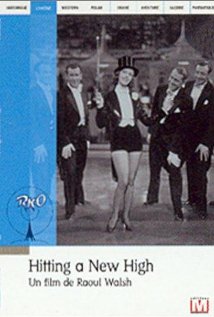
HITTING A NEW HIGH
US, 1957, 86 minutes, Black and white.
Lily Pons, Jack Oakie, John Howard, Edward Everett Horton, Eduardo Ciannelli, Eric Blore.
Directed by Raoul Walsh.
This film is a curiosity item. It was produced by RKO who hoped that opera singer, Lily Pons, would become a screen star – in the vein of Jeanette Mac Donald. It was not to be. While Lily Pons had a successful singing career, she did not have a charismatic personality screen and had a rather harsh speaking voice.
This film was directed by Raoul Walsh, who had been directing films since 1913 and was to continue into the 1960s, with a wide range of films, including tough thrillers at Warner Brothers as well as many Westerns.
Jack Oakie was a contemporary comedian and was to have a high point in his career with Charlie Chaplin, where they mocked Hitler and was Mussollini in The Great Dictator.
Popular comedian, Edward Everett Horton, usually in supporting roles is quite a prominent role in this one, using his usual mannerisms, the touch of dithering, and exposing pomposity. He is matched by comedian Eric Blore.
Nowadays the comedy of this film seems somewhat obvious and heavy-handed, a long opening with Horton wanting to be filmed with a lion – only to find that a live lion had been sent for the photoshoot . There is an expedition to Africa where Horton wants to bag a giraffe. Instead, with the connivance of Oakie, the opera singer poses as a jungle girl and is brought back to the United States with great publicity. She had been cabaret singer who wanted to enter opera, and this is an opportunity. Part of the tangles of the plot include her still having to sing in the New York club, attracting the attention of an entrepreneur played by Eduardo Ciannelli, and singing at a social occasion, exposing Horton and gaining a career.
There is a sub-plot remains where Lily Pons is in love with the orchestra conductor, John Howard, but has various clashes with him as regards career.
Not essential viewing, but a 1937 curiosity.